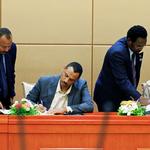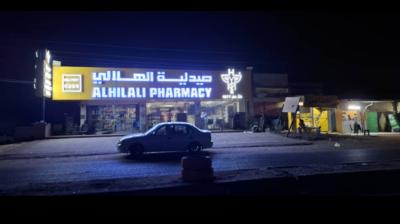COVID-19 and the challenges of social distancing in Khartoum
The Sudanese transitional government took measures early on to deal with the Covid-19 pandemic. Over the past few days, the spread of the coronavirus has taken an alarming turn in the country. The Health Emergency Committee declared a total lockdown of Khartoum State to last for three weeks; starting Saturday 18 April. Among the biggest concerns of a fragile transitional government is the lack of respect for social distancing measures and the disregard of the strong advice against large public gatherings.
A health system on the verge of breakdown
While the coronavirus has wrought worldwide havoc, so far it has appeared to treat Sudan more gently. In the course of only two days, April 13 and 14, Sudan confirmed 13 new cases of covid-19. Among the 10 cases reported yesterday, one case is from Berber in the River Nile State. This is the first confirmed case outside Khartoum.
These figures may seem insignificant compared to what is happening around the world and even within Africa. Whether these fewer cases are a story of success proving the effectiveness of the measures taken by the government or a grim tale exposing the weak health system, the Sudanese health authorities fear that the worst is yet to come.
The increase in the number of cases poses a real danger in a country where the health sector still is suffering from three decades of neglect by the Islamist regime of ex-President Omar al-Bashir who has largely invested public funds in security and military. The result of the Islamist regime’s reluctance to invest in the health sector is dramatic; There are only 4 .6 doctors per 10,000 population and most of them are located in urban centers. There are only an estimated 80 ventilators throughout the country most of which are in private hospitals that most people cannot afford.
The increase in the number of cases poses a real danger in a country where the health sector still is suffering from three decades of neglect by the Islamist regime of ex-President Omar al-Bashir.
The transitional government of Abdallah Hamdok has introduced measures to slow down the spread of the virus. Early on, the Sudanese government suspended flights from countries considered hot spots and closed its border to its neighbor Egypt. Kindergartens, schools, and universities were closed down on March 15 and have been closed ever since. A nationwide curfew was imposed on March 24, and strict restrictions on public transport and travel were gradually implemented, to the extent that people are now even prohibited from using their private cars. The Ministry of Health daily reminds people of the importance of hand washing and social distancing. These are only some of the measures introduced by the transitional government, but people largely keep ignoring the advice regarding social distancing.
Economic repercussions of social distancing measures
The coronavirus pandemic in Sudan has exacerbated an already critical situation for the country’s economy. The economic hardship faced by many Sudanese, especially those working for daily wages in the informal labor market, has made the imposition of a lockdown difficult, if not unbearable.
Social distancing is undeniably awkward for the Sudanese. To many, the request to socially distance themselves from others feels unnatural. It is unthinkable not to shake hands when greeting people - even if you bump into them for the tenth time in a day you are expected to shake hands. However, the poor in the outskirts of Khartoum are especially vulnerable. Houses in these areas are either too small, too crowded, or too crammed to allow social distancing. Vendors and children selling their stuff in streets and at traffic lights simply cannot afford social distancing.
A lack of essential goods in the country, exacerbate queues for fuel and other items. Bread shortage forces people to queue in front of Khartoum’s bakeries where few practice social distancing.
Ramadan starts on April 22 and represents a particular challenge this year. Before Ramadan, people usually buy larger quantities of food than they otherwise would. This year, people are panicking at the very real possibility of empty shelves in the stores.
Bread shortage forces people to queue in front of Khartoum’s bakeries where few practice social distancing.
COVID-19 increases political tensions
There is strong advice issued by the government to avoid large gatherings. The Minister of Religious Affairs and Endowment has even issued a three week ban on prayers and religious congregations in mosques and churches. However, people have continued to gather. Supporters of the former Bashir regime have used the government’s handling of the Covid-19 pandemic as an opportunity to demand its downfall.
On April 6, supporters of Forces for Freedom and Change (FFC) took to the street to celebrate the anniversary of the sit-in which was formed in front of the military headquarters in Khartoum one year earlier. They were met with tear gas and many were arrested for violating official orders banning public gatherings.
April 9 witnessed another demonstration, this time by supporters of dissolved National Congress Party which was the ruling political party during the era of Bashir. The protesters chanted slogans demanding the return of Bashir who has recently been sentenced to several years in prison for corruption. This demonstration was came as a shock to many, not only for jeopardizing public safety through the possible spread of the corona virus, but for the audacity of calling for the release and return of a dictator. On April 12, another demonstration was organized in Khartoum by supporters of the former regime. Protestors were calling for the fall of the government of Prime Minister Abdullah Hamdok chanting; “corona doesn't kill, bread queues do” Bashir loyalists have also argued that the measures are simply a sham by Hamdok’s government to cover up its failures.
Meanwhile, supporters of the old regime are accused of burning arable crops in Al-Jazirah State and preventing fuel reaching gas storage centres in Khartoum in order to exacerbate the economic crisis and wrestle back control of the country.
Trying to put a stop to the violations, the Prime Minister issued an Emergency Act on April 13. The Act punishes those who violate Health Emergency Regulations with fines and imprisonment.
The disregard of the temporary ban on public gatherings are now among the biggest concerns of Hamdok’s government. Without popular support for these measures, the transitional government might put its legitimacy at risk in the fight against the pandemic.
The disregard of the temporary ban on public gatherings are now among the biggest concerns of Hamdok’s government.
Sudan’s response to the covid-19 crisis follows recommendations from the World Health Organization, but although these measures have been welcomed by many; others have taken the opportunity to contest Hamdok’s government. Sudan’s health system is ill prepared for a pandemic and the economy is already strained. Social distancing and lockdown causes short term economic repercussions for ordinary people already living under precarious conditions. It is still not clear how the transitional government will address these challenges to protect vulnerable groups.
This Sudan blog post is written by Munzoul Assal, Professor of Social Anthropology at the University of Khartoum and member of the ARUS programme. This blog post was written on April 15. Numbers are continuously increasing. April 19 saw 26 new cases of people infected with COVID-19.






